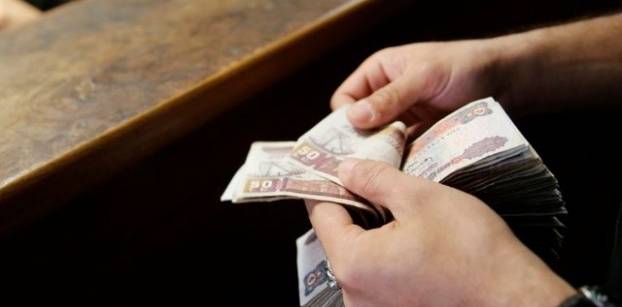Egypt's pound strengthens on black market as restrictions expected on forex deposits

A customer counts his Egyptian 50 pound notes at an exchange office in downtown Cairo
CAIRO (Reuters) - Egypt's pound on Wednesday traded at its strongest rate in over two weeks on the black market, traders said, amid speculation that new bank rules may restrict foreign currency obtained on the parallel market.
Egypt has contended with a growing shortage of dollars that has made its black market the primary source of hard currency for businesses ever since the 2011 uprising scared off foreign investors and tourists, key sources of dollars.
Its efforts to defend the pound drained reserves to $19.6 billion at the end of September from $36 billion before the uprising.
The black market rate for dollars surged to unprecedented highs this week, reaching roughly EGP 18.25 on Monday, more than twice the official rate of EGP 8.8.
That rate has begun to fall in the past two days, amid speculation that banks would stop accepting deposits of foreign currency obtained on the black market and as traders and industry leaders said they would stop tapping the market until rates came down.
One black market trader told Reuters that the dollar was being sold at EGP 15.5 on Wednesday, compared with EGP 16.5 one day earlier. Commodity traders said they were purchasing dollars for about EGP 15.
They said the rate strengthened amid expectations the central bank will require receipts for dollar deposits, effectively barring currency from being purchased on the parallel market and deposited in banks.
Several banks told Reuters that they had not yet received any formal instructions from the central bank to begin implementing such a rule.
An official at Commercial International Bank said, however, that the bank had distributed an internal memo to branches on Wednesday asking them to require documentation for all deposits.
The central bank could not be immediately reached for comment.
Speculation has been mounting for months that the central bank would devalue its currency as the black market and official rates diverged at a record pace.
Egypt is waiting for approval by the International Monetary Fund's board of a three-year loan program. In return, Egypt must carry out economic reforms, including a devaluation of the pound and painful subsidy cuts.
Commodity traders and analysts said the pound rate's rapid ascent in recent weeks was built on that speculation, with many traders temporarily halting their dollar purchases in recent days, waiting for the rate to decline.
"Eighteen pounds was not the real value by any means. The weakness in the black market was built on speculation and we think the rate should settle around 11 to 12," said head of research at Naeem Brokerage Allen Sandeep.









facebook comments